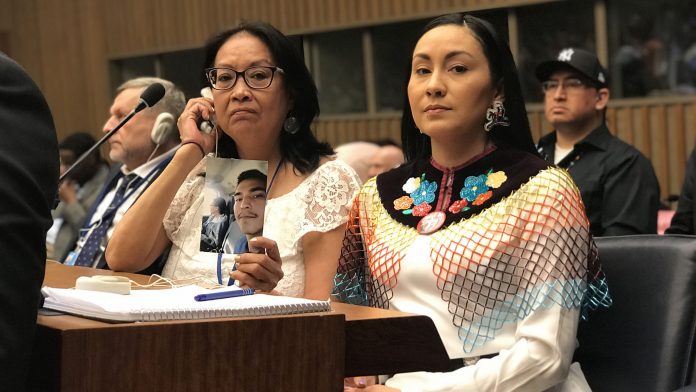
By: Kelly Chia, Staff Writer
In 2018, 56-year-old settler Gerald Stanley was acquitted of second-degree murder charges in the death of 22-year-old Cree man Colten Boushie. Immediately following the verdict, there were public outcries and protests across the country about the unjust ruling. It was another terrible example of how the Canadian justice system is still heavily infected by the colonial racism it was founded on. Boushie’s family spent the next year fighting for justice for their loved one.
This month, the Vancity theatre screened Cree filmmaker Tasha Hubbard’s new documentary nîpawistamâsowin: We Will Stand Up which looks at the aftermath and history of the case. The film follows the family over the last year to make a documentary about the case, its aftermath, and what this means for Indigenous peoples and the country.
In the film, Hubbard explores relationships between Indigenous and non-Indigenous communities through documentary footage, animated sequences, and personal testimonies. She uses animation to picture and explain the history of Canada’s relationship with Indigenous people, contextualizing these issues for viewers who may be uninformed. She also expresses her own concerns about raising her son by including conversations and scenes of the two of them reading old letters and talking about family.
Hubbard mixes calm, beautiful shots of the Prairies with animated sequences to create an authentic and intimate watching experience. The soft music and scenes of the Boushie family standing together keep the film down to earth and hopeful.
The horror of Colten’s death is also never dramatized in the film. Instead, his death is treated with grace as footage of the family and community celebrating his life on his birthday is included multiple times in the film. Having the filmmaker additionally appear and connect with the Boushie family in a sympathetic way was very unique way of experiencing the case as opposed to following it online through news outlets.
To properly convey the gravity of this story, Hubbard includes harrowing accounts of how unfairly the case was treated from the time Colten died. One particularly difficult story was Debbie Baptiste, Colten’s mother, describing the way she was treated upon hearing the news of her son’s death. She recalls how RCMP officers surrounded her house, searching her home as she grieved for her son, telling her to get her grip, and trying to smell her breath. Obviously distressed over the news of her son, Colten’s mother was confused as to why the officer was being so physical with her.
This incident highlights one of many instances where Indigenous people are still framed by stereotypes. Throughout the film, Hubbard shows racist, hateful comments from Facebook groups, which defend Stanley’s actions as self-defence and attack Boushie. These instances clearly illustrate how disrespectfully, and offensively, Colten’s death has been publicly perceived and treated.
At the end of the film, Hubbard is seen connect with her son as they talk about these histories with her adopted family and her birth father. When her grandfather asks what options someone in Stanley’s position had, her son gives a firm answer: not shooting Colten. It is a succinct ending, and a perfect response to illustrate the ridiculousness of the idea that Stanley was acting in self-defence. Although an incredibly dark topic, the film still offers kindness and hope that the more people see this, the more they can empathize, organize, and resist against injustices like this.
The Vancity Theatre has added an extended date for nîpawistamâsowin: We Will Stand Up. You can see the film June 13 at 6:30 p.m. and tickets, $11 for students, can be purchased online or at the door.



